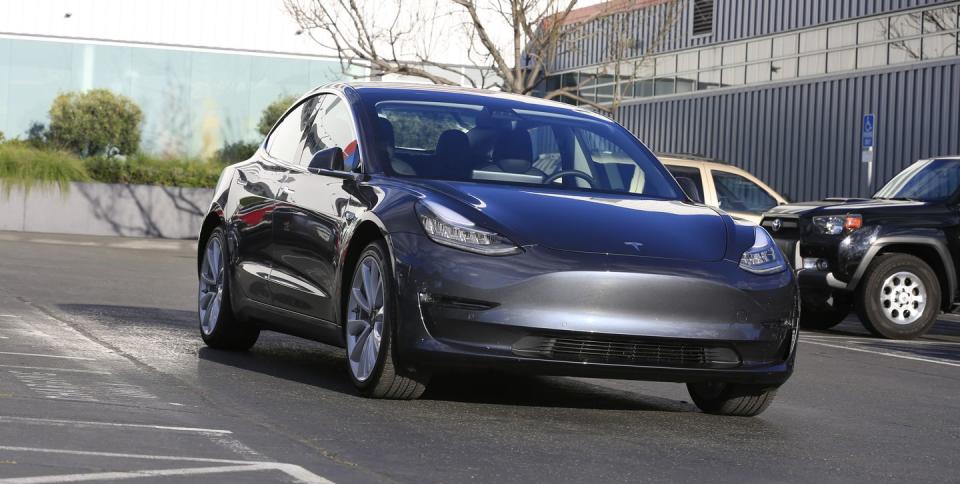NHTSA Upgrades Tesla Autopilot Crash Probe

NHTSA has upgraded its probe into instances of Tesla crashes into first responder vehicles from a preliminary evaluation to an engineering analysis, bringing it one step closer to a possible recall.
The agency has been examining over a dozen instances of crashes involving Tesla models being driven with Autopilot engaged in which they've crashed into fire trucks, police cars, or crash attenuator trucks used by highway maintenance workers.
The NHTSA also intends to assess the degree to which the Level 2 system could "exacerbate human factors or behavioral safety risks by undermining the effectiveness of the driver’s supervision."
Last summer the National Highway Traffic Safety Administration launched an investigation into Tesla's Autopilot driver-assist system, following a string of Tesla crashes into the backs of parked emergency vehicles. The agency cited a number of crash reports at the time, many of which occurred at or near highway speeds, in which Tesla owners drove into the backs of fire trucks and police cars while using Autopilot.
The NHTSA has now upgraded this evaluation to an engineering analysis, potentially bringing the probe closer to a recall.
"Upon opening the investigation, NHTSA indicated that the PE [Preliminary Evaluation] would also evaluate additional similar circumstance crashes of Tesla vehicles operating with Autopilot engaged, as well as assess the technologies and methods used to monitor, assist, and enforce the driver’s engagement with the dynamic driving task during Autopilot operation," the agency noted.
About a month after the preliminary evaluation was opened in August 2021, Tesla introduced an over-the-air update which would allow Autopilot to detect emergency vehicle lights, but only at night.
The NHTSA said this week it has added six more crashes to its investigation since August 2021, including three in Orlando, FL; Petaluma, CA; and Desert Center, CA; involving first responder vehicles or crash attenuator trucks. An additional three involved a police car, a first responder vehicle, and another crash attenuator truck. One of these crashes, dating back to 2020, was reported to the agency only this March.
Interestingly, the NHTSA has also decided to not investigate an additional Laguna Beach, CA, crash because in that instance the vehicle into which a Tesla crashed was not parked in a traffic lane and was not using emergency lights.
"All subject crashes occurred on controlled-access highways. Where incident video was available, the approach to the first responder scene would have been visible to the driver an average of 8 seconds leading up to impact," the agency noted. "Additional forensic data available for 11 of the collisions indicated that no drivers took evasive action between 2-5 seconds prior to impact, and the vehicle reported all had their hands on the steering wheel leading up to the impact."
The agency also plans to examine the degree to which the Level 2 system could "exacerbate human factors or behavioral safety risks by undermining the effectiveness of the driver’s supervision."
This point concerns one fairly common criticism of the system: its lack of a more effective driver attention monitoring system. The agency indicated that in 11 of the 16 crashes, the drivers actually had their hands on the steering wheel, as required by the automaker's official warnings, but still suffered a crash.
Even aside from driver attention monitoring, the Autopilot system has faced controversy for a variety of other issues such as its limited array of sensors, potential for driver misuse, and instances in which the system disregarded or could not detect large solid objects.
Depending on the conclusions of the engineering analysis, the probe could escalate to a recall or simply be closed.
Earlier this year the NHTSA launched a separate investigation into instances of phantom braking by Tesla vehicles, in which brakes are applied by the vehicle automatically in response to a false sensor reading of an obstacle on the road. In these incidents Tesla vehicles frequently decelerate rapidly on highways, increasing the risk of a crash from behind.
Does an elevated federal probe into Tesla's Autopilot system impact your view of the brand or its vehicles? Please comment below.

 Yahoo Autos
Yahoo Autos 